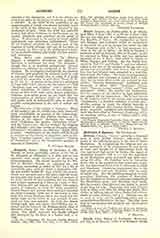

Alcimus (Greek: `Alkimos, “brave,” probably a Graecized form of Heb. ALYQYM, Eliacim), high-priest, the leader of the hellenizing party in the time of Judas Machabeus. By antagonizing the religious and national sentiments of his countrymen, he won favor at court, and though not of high-priestly stock, he was appointed high-priest by Lysias, the regent of Antiochus Eupator (162 B.C.); but the opposition of the Machabean party prevented him from exercising the office. He therefore went to Demetrius Soter, who in the meanwhile had overthrown Eupator, and denounced Judas and his adherents as rebels and disturbers. Demetrius reappointed him to the high-priesthood and sent Bacchides with an army to install him. But the perfidious slaughter of sixty prominent Assideans, the cruelties of Bacchides, and the excesses of Alcimus’s followers strengthened the Machabean party, and Bacchides had hardly left the country when Alcimus was forced to appeal to the king for help. Demetrius first sent Nicanor with an army, and, after his defeat and death, Bacchides, in fighting against whom Judas died a heroic death at Laisa (Eleasa), 160 B.C. Alcimus now set to work to carry out his hellenizing policy and to persecute those faithful to the law. But that same year he was stricken with paralysis and died in great suffering.
F. BECHTEL

